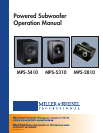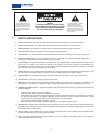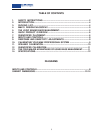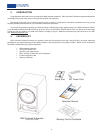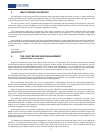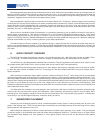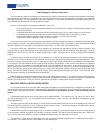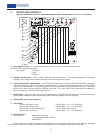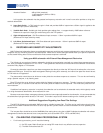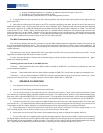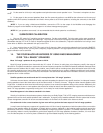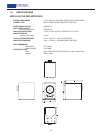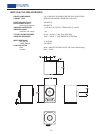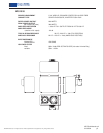
Anechoic Position- 3dB at 20Hz (anechoic)
+/-1dB pass band (40Hz to 150Hz)
-3dB at 200Hz
In this position the subwoofer has the greatest low frequency extension and in small rooms often provides a rising char-
acteristic below 35Hz.
H) Input Gain Switch - In THX mode, the gain is fixed and provides 90dB of output when a 200mv signal is applied to the
balanced input (100mv unbalanced).
I) Variable Gain Knob - Variable gain knob provides gain settings from -∞ to approximately +20dB above reference.
Reference is equal to the input gain switch being set to the THX position.
J) Right Un-balanced Input - 15K Ohms balanced input connector - 100mv in produces 90dB of output
(Reference/THX input sensitivity mode)
K) Left /Mono Un-balanced Input - 15K Ohms balanced input connector - 100mv in produces 90dB of output
(Reference/THX input sensitivity mode)
9. RESPONSE AND SENSITIVITY ADJUSTMENTS
M&K Professional subwoofers feature user adjustable response, sensitivity and crossover adjustments in order to allow for easy
integration into any monitoring system or acoustical space. Make sure to use the settings that best match your specific components
so that double filtering does not occur and that the most accurate response is achieved.
Using your M&K subwoofer with External Bass-Management Electronics
The following is an overview of how the subwoofer should be connected when used with an external bass-management sys-
tem, such as the M&K Professional LFE-4 or LFE-5. These guidelines should also be followed when the subwoofer is used with a
consumer Dolby Digital or THX decoder.
Connect the subwoofer output from your bass-management box directly to either the XLR input of the subwoofer or the mono-
unbalanced RCA input. Since all the bass-management filtering is being done externally, the internal low pass filter should be set
to THX mode so it is bypassed.
The phase switch should be set to whichever mode yields the smoothest response at crossover. This can be confirmed by
using a spectral analyzer, or by listening tests.
Bass EQ should be set to whichever mode yields the flattest low frequency response. Typically, because of a phenomenon
known as room gain, it has been found that the THX mode yields the flattest in-room response. This mode also yields the maxi-
mum headroom.
If additional low frequency extension is required, the subwoofer can be switched to its extended mode, which typically results
in a rising characteristic below 30Hz, when measured in room.
Because most external bass-management boxes provide their own output adjustment for the subwoofer, it is recommended that
the subwoofers input gain switch be set to THX mode. This mode is equal to the reference setting on the variable gain knob.
Additional Suggestions Regarding Low-Pass Filter Settings
The MPS-5310 features an adjustable 36dB per octave, variable low-pass filter. This filter can be useful when using this sub-
woofer with non M&K Professional monitors so as to help provide a perfect match at crossover between the main speaker(s) and
the subwoofer.
The low-pass filter should be set to the 24dB/80Hz filter setting when using the an M&K Professional subwoofer with a bass-
management controller that does not have a low-pass filter (such as the M&K LFE-4, LFE-5 and BMC-Mini).
10. CALIBRATING YOUR M&K PROFESSIONAL SYSTEM
1. For this set-up procedure, you will need the following:
a.) An SPL meter. Radio Shack has an analog SPL meter that is very effective and not expensive.
b.) The M&K Professional test CD.
9



